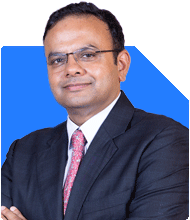I am 40 years old in my monthly earning i have decided to invest Rs 10 000/- to four of the best mutualfund in SBI only in SIP please suggest me the best mutual fund for a duration of more than 7to10years thankyou.
Ans: At 40 years old, you've made a wise choice by deciding to invest Rs 10,000 monthly in mutual funds. Choosing to invest in four mutual funds through SIPs is a solid approach. A long-term horizon of 7 to 10 years aligns well with your goals, allowing your investments to grow and benefit from compounding.
However, instead of focusing on selecting specific funds, let’s discuss the types of funds that would suit your needs and how to structure your portfolio for optimal growth.
Importance of Diversification
When investing in mutual funds, diversification is key. By spreading your investment across different types of funds, you reduce risk and increase the potential for returns.
Equity Funds: These funds invest in stocks and offer high growth potential. Given your long-term horizon, equity funds should form a significant part of your portfolio. They are best suited for wealth creation over a period of 7 to 10 years.
Debt Funds: These funds invest in fixed-income securities like bonds. While they offer lower returns compared to equity funds, they provide stability. Including some debt funds can help balance the risk in your portfolio.
Hybrid Funds: Hybrid funds invest in both equity and debt instruments. They offer a balanced approach, giving you exposure to the growth potential of equities while cushioning the portfolio with the stability of debt.
Sectoral and Thematic Funds: These funds focus on specific sectors or themes like banking, technology, or infrastructure. While they can offer high returns, they also come with higher risk. It’s advisable to allocate a smaller portion of your investment to these funds if you have a higher risk appetite.
SIPs: The Power of Consistency
Investing through SIPs is a smart choice for several reasons:
Rupee Cost Averaging: SIPs help you buy more units when prices are low and fewer when prices are high. This reduces the average cost per unit over time.
Discipline: SIPs instill a habit of regular investing, which is crucial for long-term wealth creation.
Flexibility: SIPs offer the flexibility to start, stop, or modify your investment amount based on your financial situation.
Compounding: Over time, the returns generated on your SIP investments will start generating returns themselves, leading to exponential growth.
Actively Managed Funds vs. Index Funds
You might have heard about index funds, but it's essential to understand the differences.
Actively Managed Funds: These funds are managed by professional fund managers who actively select stocks and adjust the portfolio based on market conditions. They have the potential to outperform the market, offering higher returns.
Index Funds: These funds track a specific index like the Nifty 50. While they have lower management fees, they simply mirror the market and lack the potential to outperform it. Over time, actively managed funds might provide better returns, especially in a well-managed SIP.
Given the advantages, you might prefer actively managed funds for your SIPs, especially with a long-term horizon.
Disadvantages of Direct Funds
Direct funds might seem appealing due to lower expense ratios, but they come with certain drawbacks:
No Professional Guidance: Direct funds do not offer advisory services. You’ll need to choose and manage your investments without professional help, which can be challenging.
Time-Consuming: Monitoring and rebalancing your portfolio can be time-consuming and require a good understanding of the market.
Benefits of Regular Funds: By investing in regular funds through a Certified Financial Planner, you get access to expert advice. A CFP can help you select the right funds, monitor your investments, and make necessary adjustments.
Structuring Your Portfolio
Given your decision to invest in four mutual funds, here's a suggested structure:
Large Cap Equity Fund: Allocate a significant portion to a large cap fund. These funds invest in well-established companies with a history of stable returns. They offer lower risk compared to mid or small cap funds and are a good foundation for your portfolio.
Mid Cap Equity Fund: Mid cap funds invest in companies that are smaller than large caps but have strong growth potential. They are slightly riskier but can offer higher returns over time.
Hybrid Fund: Consider including a hybrid fund to balance the equity exposure with some debt. This reduces overall portfolio risk and adds stability, especially in volatile markets.
Debt Fund: A small allocation to a debt fund will provide stability and help in managing the overall risk of your portfolio.
This balanced approach allows you to tap into the growth potential of equity while maintaining some stability with debt investments.
Importance of Regular Reviews
Once you’ve set up your SIPs, it’s important to review your portfolio regularly. Markets and your personal financial situation can change, so periodic reviews will ensure that your investments stay aligned with your goals.
Annual Review: Conduct an annual review of your portfolio with a Certified Financial Planner. This will help you assess performance and make necessary adjustments.
Rebalancing: Over time, certain funds may outperform or underperform. Rebalancing ensures that your portfolio remains aligned with your risk tolerance and investment goals.
Final Insights
Investing Rs 10,000 monthly in four mutual funds through SIPs is a well-thought-out decision. Diversifying across different types of funds, focusing on actively managed funds, and seeking professional guidance will help you achieve your financial goals over the next 7 to 10 years.
Stay disciplined with your SIPs, review your portfolio regularly, and ensure your investments are aligned with your long-term goals.
Best Regards,
K. Ramalingam, MBA, CFP,
Chief Financial Planner,
www.holisticinvestment.in


























